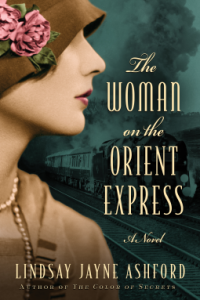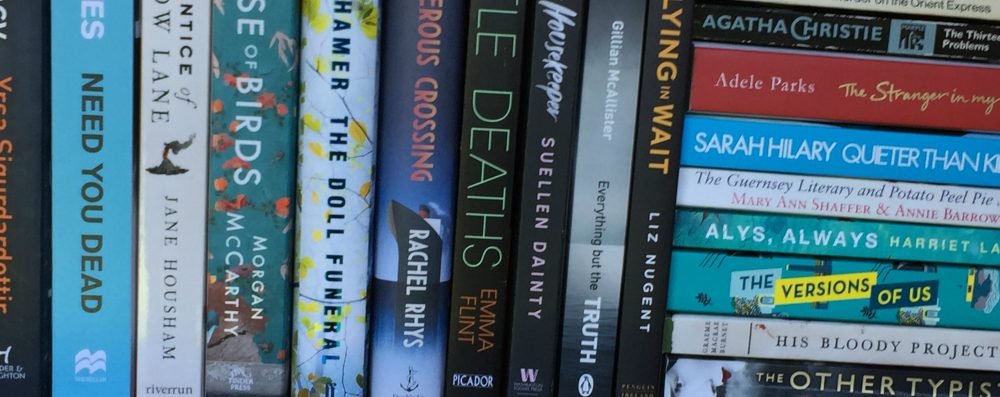
4*s
The synopsis gives us a flavour of what The Woman on the Orient Express has in store for us, promising secrets not easy to unravel on a journey on the iconic train line. The subject, ‘The Woman’ is Agatha Christie, the reason for the trip is an escape from England after the end of her marriage to Archie, the secrets… well it would appear that more than one passenger has something to hide.
I’m sure I’m not alone in feeling a certain amount of discomfort when starting to read one of these factional tales, if for no other reason than it is not always clear where the lines between fact and fiction lie.
The plot is very much one of the time it is set in, being the 1928, a time when it was surely less usual for a single woman to be travelling to Baghdad but Agatha has that covered, she is travelling under the assumed name of Mary Miller. For her she wants to be well away from her home when Archie marries his second wife and with her daughter Rosalind at boarding school there is little to make her stay. Being a writer she can use the trip to come up with some plots for the books.
The chapters set on the train, are headed up with the legs of the journey, and it isn’t long before Agatha meets another young woman, Katherine Keeling who is a widow, making the journey to join the archaeological dig at Mesopotamia under the esteemed archaeologist Leonard Wooley. Later in the journey another young woman is introduced, one who is fleeing her abusive husband to stay with her cousin in Baghdad.
The book was far more evocative of both time and place than I expected, the descriptions of both the train and the destination of Baghdad giving this reader a flavour of what the trips that Agatha Christie did make, were like. The time period was underlined by the way the women conducted themselves with little interaction with others on the journey except those employed by the train company. Despite being in close quarters each of the women held key secrets back from each other which are only revealed once they arrive at their destination.
This isn’t a murder mystery tale, more like historical fiction with the three women at a crossroads in their life, all needing to face some truths from their past and then to find a way forward. That said, it is a very engaging story, with enough intrigue to keep this reader turning the pages to find out exactly what the outcome would be – reader be warned, this isn’t some saccharine sweet tale where everything turns out rosy! The book has a few scenes that are full of action which seem out of place in what at times feels like a woman’s fictional novel (and I don’t use that phrase in a derogatory manner), which indicates how hard it is to categorise this book. One of the jarring points was, as much as I love Poirot, the fictional Agatha hearing both the Belgium detective and her mother talking to her throughout the book was most off-putting, perhaps because I deem our heroine far too certain to have to listen to imaginary voices before taking any course of action.
Earlier on I mentioned the difficulty with identifying the artistic licence in this kind of writing so I’m pleased to report that at the end the author makes it clear which parts she took liberties with and which sources she used for the factual elements.
A surprisingly enjoyable read which gives a flavour of a key point in Agatha Christie’s life by weaving a story around her trip that felt reasonably credible.
I’d like to thank the publishers Lake Union Publishing, who allowed me to read an advance copy of The Woman on the Orient Express ahead of publication on 20 September 2016. This unbiased review is my thank you to them.
First Published UK: 20 September 2016
Publisher: Lake Union Publishing
No of Pages: 330
Genre: Historical Fiction
Amazon UK
Amazon US

I am a Agatha Christie fan and this book which took a part of her life weaving it into a good story was very likeable.
LikeLike
It was an enjoyable read, I was worried it would be to ‘slushy’ but I thought it had just the right balance.
LikeLike
This sounds like an interesting and fascinating read. Especially as I’ve read so many Christie books, to read one with her as the protagonist would keep me turning the pages I imagine.
LikeLike
I was a bit worried it would feel gimmicky but the author got the tone just right with enough real detail to keep it on track.
LikeLiked by 1 person
Glad you liked this as I have it to read as well. It always looked an interesting read but since my recent Agatha experience I feel I’ll enjoy it even more.
LikeLike
Well I do hope you find it as enjoyable as I did Jill 🙂
LikeLiked by 1 person
I’m very glad you enjoyed this one, Cleo. And I’m doubly glad that the author makes it clear where she takes license. It’s a really interesting concept for a story, and I”m glad that you found there was a sense of the time and place. To me, anyway, that’s really important.
LikeLike
I think the detail about what was, and was not, factual actually made me like the book more – there is nothing worse than being unsure where the truth lies.
LikeLiked by 1 person
I’m quite interested in this one. At first I thought it might be an account of those ‘missing days’ that Christie had, but I think she was still married to Archie Christie at the time of her ‘disappearance’. This seems to be later. Love the idea of her travelling by train. I’ll watch for this one.
LikeLike
Yes it is later, the Agatha in the book, refers to those missing days and gives an explanation – it was all the media interest over that episode that makes her travel incognito at the point of Archie’s remarriage.
LikeLike
Not too keen on that cover – they could have made it a bit more atmospheric? Was this episode meant to have happened after Christie’s real life disappearance or after?
LikeLike
This episode was after her disappearance which is referred to in the book, and the reason given for her travelling under an assumed name – she didn’t want the press to know where she was.
LikeLiked by 1 person
I have yet to read Agatha Christie, so I suspect I should do so before engaging in one of these factional accounts. This one sounds good, though. Thanks for sharing.
LikeLike
Thanks Laurel, yes it is the sort of book that works best if you already know some of the background.
LikeLike
Hmm… I’m glad it worked well for you, but I think I’ll be able to resist. It’s odd – sometimes I can really enjoy fiction based on real people and other times it just outs me off. I think it might depend on how much I like the person. I’m always wary of reading biographies and autobiographies of writers too in case they put me off someone I like.
LikeLike
Once again you hear me to it, lol. I’ll read your review after I read the book. Your reviews are always excellent.
LikeLike
Seems like an intriguing read! Thanks so much for sharing. I hadn’t heard of this one before.
-Lauren
http://www.shootingstarsmag.blogpsot.com
LikeLike
I’ll look out for this book. I know that feeling of discomfort reading a fictionalised account of a real person – I had it reading Nicola Upson’s books about Josephine Tey. i expect one of her sources is AC’s ‘Come Tell Me How You Live’ – have you read that one?
LikeLike